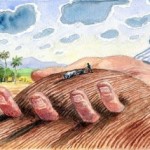
Women in country after country face dire consequences of weak governments.
from Oxfam
Investors are targeting the world's weakest-governed countries to buy land, according to new analysis published on Oxfam's international day of action against land grabs Thursday. Oxfam's GROW campaign is calling on the World Bank to lead the fight against land grabs.
The analysis reveals that over three quarters of the 56 countries where land deals were agreed between 2000 and 2011 scored below average on four key governance indicators. The 23 least developed countries account for more than half of the recorded land deals over this period.
“It's no accident that investors are most active in countries where citizens' rights are least protected because they have governments unable or unwilling to defend them,” said Robert Fox, executive director of Oxfam Canada. “In country after country we see the dire consequences for rural women and their families.”
“Investors seem to be cherry-picking countries with weak rules and regulations because they are ‘easy marks’. This can spell disaster for communities if these deals result in their homes and livelihoods being snatched away.”
“Poor governance is good business for investors looking to secure land quickly and cheaply,” said Jeremy Hobbs, executive director of Oxfam International. “Investors seem to be cherry-picking countries with weak rules and regulations because they are 'easy marks'. This can spell disaster for communities if these deals result in their homes and livelihoods being snatched away without consent or compensation.”
For the day of international action on land grabs, iconic sites around the world, from Parliament Hill in Ottawa and the CN Tower in Toronto, to the Lincoln Memorial in Washington and the Coliseum in Rome, are being symbolically “sold” by Oxfam campaigners.
The research for Poor Governance, Good Business cross referenced data from the Land Matrix — a database of reported agricultural land deals involving 200 hectares or more of land — with World Bank indicators that measure how well a country is governed.
The analysis found that the average score across four key governance indicators in countries with land deals was 30 per cent lower than those without deals. The four indicators are voice and accountability (eg whether citizens participate in selecting their government), rule of law, the quality of private sector regulation, and control of corruption.
In a number of cases the potential area of land available for investment does not appear to be a significant factor. For example in Guatemala, which scores below average on all four governance indicators, 87,000 hectares of land changed hands in the last ten years, despite high levels of hunger and malnutrition in rural areas. In contrast, Botswana, which has a similar area of land available per head of population but which scores well above the average on governance indicators, reportedly did not agree to a single large-scale land deal.
Oxfam is calling on the World Bank to temporarily freeze large scale agricultural land investments so that it can ensure its policies do not encourage land grabs.
Oxfam's analysis is supported by the World Bank's own research.
Oxfam is calling on the World Bank to temporarily freeze large scale agricultural land investments so that it can ensure its policies do not encourage land grabs. The Bank is in a unique position to act because it sets international standards for land investments, provides finance for land deals and advises developing countries on land investments.


Sorry, the comment form is closed at this time.